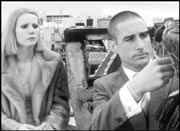THE ROYAL TENENBAUMS
directed by Wes Anderson with Danny Glover, Gene Hackman, Anjelica Huston, Gwyneth Paltrow, Ben Stiller, Luke Wilson, Owen Wilson, and Bill Murray opens Dec. 21 at Neptune
ALL HAPPY FAMILIES are alike, but unhappy families are unhappy in their own locked-in-amber mid-’70s fashion. Such is the case with Manhattan’s Tenenbaum clan, first introduced in a vintage storybook past of Kate Spade ads and wide lapels. During the era of their apotheosis, when tape decks run reel-to-reel and Bj�Bjorg never goes out of style, parents Royal (Gene Hackman) and Etheline (Anjelica Huston) raised three prodigies: financier Chas (Ben Stiller), playwright Margot (Gwyneth Paltrow), and tennis star Richie (Luke Wilson). But the team has fallen on hard times, “two decades of betrayal, failure, and disaster,” says The Royal Tenenbaums‘ narrator (Alec Baldwin).
Who’s to blame? The obvious culprit is enjoyably rascally, conniving, uncontrite Royal (resplendent in ’70s shades, double-breasted suits, and cravats), who’s hopelessly out of step with enlightened parenting practices. In one of Tenenbaums‘ many expository flashbacks, we see him shooting one of his own kids in a game of BB-gun war. So what if they’re on the same team? Teams mean nothing, he sneers, which encapsulates his entire notion of family: It’s a battleground.
Thus, attorney Royal repeatedly thoughtlessly introduces young Margot to friends as “my adopted daughter,” cheats on his wife, then later suffers the indignity of preteen Chas disbarring him for securities fraud. Once grown, with their parents long separated, the three messed-up adult Tenenbaum kids have major issues with their dad, who then claims terminal cancer to ingratiate himself anew. They’re suspicious, as is Etheline, whose long-dormant love life is being reawoken by a mild- mannered accountant (Danny Glover).
All these parties converge at a family mansion that features its own Circle-T pennant fluttering atop the roof and a push-button intercom to announce regular crises. The whole movie thus feels constructed as if from old New Yorker cartoons—Charles Addams, Gahan Wilson, George Booth—or dioramas from the Museum of Natural History. Previously the director of Bottle Rocket and Rushmore, Wes Anderson fetishizes the N.Y.C.-centric details of Tenenbaums like so many Joseph Cornell boxes; each scene is a chapter, a specimen, really. (His idealized New York makes Woody Allen seem like Cassavetes.) The Tenenbaums owe much to both Heloise and Salinger’s Glass family (Franny and Zooey, etc.); the effect is more scrapbook than motion picture.
THAT’S A SHAME. While individual laughs abound, Tenenbaums never amounts to more than the sum of its often-inspired parts. It’s brilliantly assembled, not brilliantly directed.
Don’t fault the cast. With eyes mascaraed like a raccoon, Paltrow is deadpan funny; Stiller’s slow-burn hatred of his father reaches an apt, if sentimental, coda; and co-writer Owen Wilson achieves some truly inspired moments as a drug-addled writer and Tenenbaum-wanna-be obsessed with Margot. (His crazed premise for a revisionist Western novel is alone worth the ticket price.) Glover and Huston are given less to work with, while Luke Wilson is handed an overtly ridiculous part that finally succumbs to melodrama. Again, as in Rushmore, he’s the fourth leg of an unwieldy love triangle also including Bill Murray, who plays Margot’s consternated husband (a small role).
In marketing shorthand, Tenenbaums could be called a dysfunctional family seriocomedy, but Anderson has no interest in conventional sitcom resolutions. The clich頯f the repentant father begging for forgiveness is wrapped up conventionally, but the movie’s forbidden romance is left hanging in an obstinate, nose-thumbing fashion. Perhaps Anderson feels he’s too much the artist for easy endings, that he’s too good for kisses in the sunset, but his craft isn’t good enough yet to ignore such niceties. For now, like his fellow-mannerists the Coen brothers, the quirky self-assurance begins to look precious and contrived. Anderson peppers his soundtrack with oddball hits from the ’60s and ’70s but fails to grasp their significance: They originally meant something, once upon a time.








